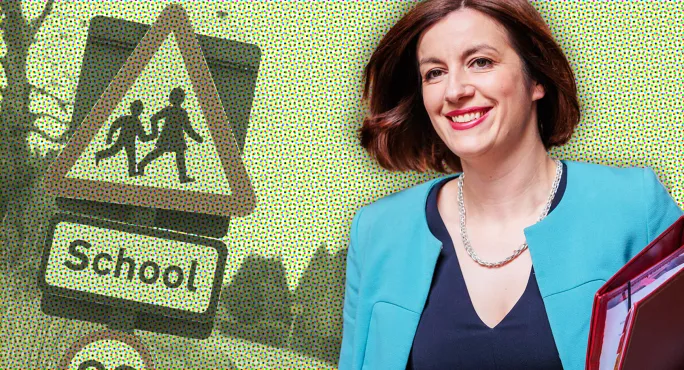
Phillipson sets out four priorities for RISE teams

The education secretary has set out the four priorities for RISE teams’ universal support offer for schools.
Regional Improvement for Standards and Excellence (RISE) teams will prioritise attainment with a focus on English and maths, Bridget Phillipson told the Association of School and College Leaders conference in Liverpool this morning.
“All children need that firm foundation of attainment,” she said. “That’s why the prime minister’s plan for change sets attainment as a key milestone.”
Ms Phillipson added: “We’ll drive progress across the board but especially for kids from tough backgrounds. And that progress must start early in life, when the possibilities still stretch out ahead.”
The other three priorities are Reception year quality, attendance and inclusion, she added.
The RISE teams’ universal support offer will be available to all schools.
ASCL concerns
ASCL general secretary Pepe Di’Iasio asked the secretary of state whether she was worried by the union’s concerns over Ofsted’s proposals for the new report card and its impact on wellbeing and recruitment.
“I appreciate this has sparked a lively conversation, but as I mentioned in my speech, we want to work with you on this - but I also just have to be pretty upfront about saying that this is also about children and their life chances too,” Ms Phillipson said in response.
“And there do sometimes have to be some decisions taken as to how we ensure that, where schools are not performing as they should, we intervene and we act, because children only get one chance.”
More from the ASCL conference:
- Ofsted plans will ‘sledgehammer’ teacher recruitment, warns ASCL
- Schools need ‘old-fashioned graft’ to stop absence ‘damage’
- Social media being ‘weaponised’ against schools and teachers
Ms Phillipson also mentioned the government has announced it would spend £2 million to increase support for reading and writing.
This will include publishing a framework this summer setting out a “common approach” for teaching writing.
On the RISE teams’ attendance priority, the education secretary also said in her speech that some schools are “not making enough progress” on absence.
Focus on attendance
She also said the new school report cards include a focus on attendance.
The first 20 RISE advisers have gone into schools for targeted intervention for the 600 schools the Department for Education has categorised as “stuck”.
“Where performance isn’t good enough, RISE teams will be there with targeted interventions, intensive mandatory support, backed by investment and guided by top leaders from top schools and top trusts,” Ms Phillipson said.
DfE’s plans for behaviour
Speaking to reporters after her speech, Ms Phillipson said the DfE would be setting out more detail in “the months to come” the approach it will be taking to tackle behaviour concerns in schools.
She added she has met with behaviour adviser Tom Bennett to talk about what he thinks are the key areas schools need support on to tackle behaviour issues.
She did not confirm, when asked by Tes, whether Mr Bennett will stay on as behaviour adviser beyond when his contract finishes at the end of this month.
The education secretary also said the DfE is “looking carefully” at what more the government can do “to ensure that parental complaints don’t weigh down too heavily on schools and school leaders”.
Asked about when a decision will be made on whether to extend the statutory override that is keeping high-needs deficits off councils’ books, Ms Phillipson said she could not currently put a timescale on a decision.
Special schools ‘a central part’ of SEND reform
The secretary of state was also asked whether there were any plans to reform the specialist sector outside of mainstream.
“They [special schools] will be a central part of any reform that we drive forward in this area. I know the pressures that they’re facing around increasing demand and lack of places,” she said.
Ms Phillipson added: “Overall, I do believe we need to move towards a system where there is more mainstream inclusion.”
Special school heads have raised concerns previously that efforts to make schools more inclusive risk ignoring the huge amount of expertise in the specialist sector.
Tes also previously revealed that the minister covering special educational needs and disabilities visited no special schools for at least four months after the general election.
For the latest education news and analysis delivered every weekday morning, sign up for the Tes Daily newsletter
You need a Tes subscription to read this article
Subscribe now to read this article and get other subscriber-only content:
- Unlimited access to all Tes magazine content
- Exclusive subscriber-only stories
- Award-winning email newsletters
- Unlimited access to all Tes magazine content
- Exclusive subscriber-only stories
- Award-winning email newsletters
You need a subscription to read this article
Subscribe now to read this article and get other subscriber-only content, including:
- Unlimited access to all Tes magazine content
- Exclusive subscriber-only stories
- Award-winning email newsletters
- Unlimited access to all Tes magazine content
- Exclusive subscriber-only stories
- Award-winning email newsletters



